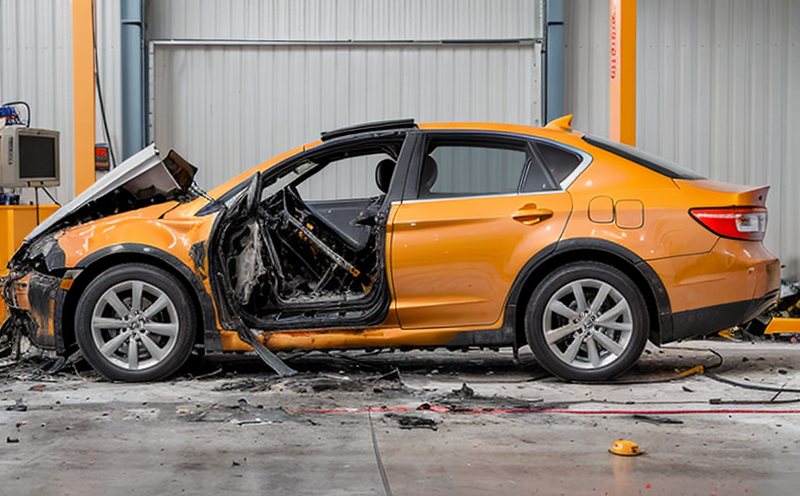UNE EN 62619 Mechanical Abuse Testing of Industrial Lithium Batteries
The UNE EN 62619 standard is a critical component for ensuring the safety and reliability of industrial lithium batteries in a variety of applications. This test evaluates the resilience of these batteries under conditions that simulate potential real-world mechanical abuse scenarios, such as impact, vibration, and thermal stress. The primary objective is to assess how well the battery can withstand such stresses without compromising its integrity or causing hazardous situations.
The testing procedure involves subjecting the battery to specific levels of force, temperature variations, and other environmental conditions that mimic crash or drop events. This ensures that the batteries meet stringent safety requirements set forth by regulatory bodies around the world. Compliance with this standard is essential for manufacturers aiming to ensure their products are safe and reliable in all environments where they may be used.
The mechanical abuse test typically includes several distinct phases, each designed to simulate a particular type of stress or impact that a battery might encounter during its lifecycle. For instance, one phase might involve dropping the battery from a specified height onto an abrasive surface, while another could expose it to rapid temperature changes. These tests are conducted in accordance with the detailed guidelines provided within EN 62619, which specifies exact procedures and acceptance criteria.
The importance of this testing cannot be overstated, especially considering the growing demand for industrial lithium batteries across various sectors including automotive, electronics, and renewable energy storage systems. By adhering to these standards, manufacturers can demonstrate their commitment to safety while also ensuring that their products perform consistently under challenging conditions. This not only enhances brand reputation but also fosters trust among end-users who rely on reliable power sources.
It is worth noting that the results of this test are highly valuable for R&D teams as well as quality assurance departments. They provide critical insights into areas where improvements can be made, helping to refine designs and improve overall performance over time. Furthermore, successful completion of these tests can significantly enhance a company’s competitive edge in an increasingly regulated market.
Scope and Methodology
The scope of the UNE EN 62619 mechanical abuse testing covers various types of industrial lithium batteries used across different industries. This includes but is not limited to traction batteries for electric vehicles, stationary storage units for renewable energy systems, and portable power packs employed in consumer electronics.
- Drop Test: Batteries are dropped from specified heights onto hard surfaces to simulate accidental falls or drops during transport or use.
- Vibration Test: The batteries undergo controlled vibration tests at specific frequencies and amplitudes to replicate the effects of transportation vibrations on performance.
- Thermal Shock: Batteries are exposed to rapid temperature changes between extremes (e.g., -40°C to 85°C) to evaluate their resistance against thermal shock without compromising safety or functionality.
The methodology outlined in EN 62619 provides precise instructions on how each test should be carried out, including the exact conditions under which they must occur. Compliance with these guidelines ensures consistency and repeatability of results across multiple tests conducted by different laboratories worldwide.
Why Choose This Test
The UNE EN 62619 mechanical abuse testing is crucial for several reasons, primarily related to enhancing product safety and reliability. One key advantage lies in its ability to identify potential weaknesses early on during the development phase of a new battery design. By exposing the prototype batteries to simulated crash or drop conditions, developers can pinpoint areas requiring improvement before full-scale production begins.
Another significant benefit is enhanced compliance with international regulations governing lithium-ion battery safety. Meeting these standards not only protects manufacturers from legal repercussions but also opens up access to global markets where stringent safety requirements apply. Moreover, successful completion of EN 62619 testing can significantly boost a company’s reputation among consumers and stakeholders alike.
In addition to regulatory compliance and improved product quality, the test offers valuable data regarding battery performance under extreme conditions. This information is invaluable for R&D teams looking to optimize design parameters or explore new applications for industrial lithium batteries. Additionally, it helps procurement departments select suppliers based on proven reliability rather than just price alone.
Finally, adopting this testing protocol demonstrates a proactive approach towards ensuring customer satisfaction and safety. It shows that manufacturers are committed to producing high-quality products capable of withstanding real-world challenges without compromising on performance or safety standards.
Competitive Advantage and Market Impact
- Increased Safety Reputation: Compliance with UNE EN 62619 enhances a company’s reputation as a leader in safety-conscious manufacturing, making it more attractive to potential customers.
- Better Product Quality: The rigorous testing process ensures that only high-quality batteries make it to market, improving overall customer satisfaction and brand loyalty.
- Global Market Access: Meeting international standards opens up opportunities for selling products in countries with strict regulations regarding lithium-ion battery safety.
- Innovation Opportunities: The insights gained from testing provide valuable data that can be used to innovate and improve future product generations.
The impact of adhering to UNE EN 62619 extends beyond individual companies; it contributes positively to the entire industry by setting benchmarks for safety standards. As more manufacturers adopt this practice, collective progress towards safer technologies will accelerate, benefiting both producers and consumers alike.





